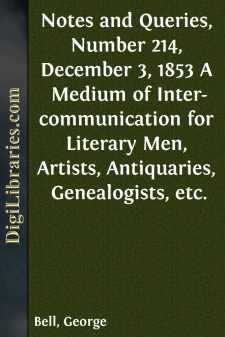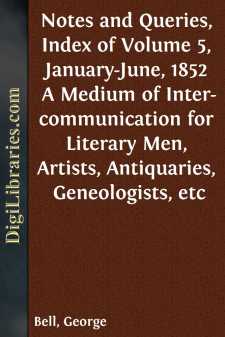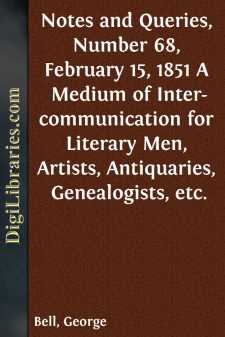Categories
- Antiques & Collectibles 13
- Architecture 36
- Art 48
- Bibles 22
- Biography & Autobiography 813
- Body, Mind & Spirit 142
- Business & Economics 28
- Children's Books 17
- Children's Fiction 14
- Computers 4
- Cooking 94
- Crafts & Hobbies 4
- Drama 346
- Education 46
- Family & Relationships 57
- Fiction 11829
- Games 19
- Gardening 17
- Health & Fitness 34
- History 1377
- House & Home 1
- Humor 147
- Juvenile Fiction 1873
- Juvenile Nonfiction 202
- Language Arts & Disciplines 88
- Law 16
- Literary Collections 686
- Literary Criticism 179
- Mathematics 13
- Medical 41
- Music 40
- Nature 179
- Non-Classifiable 1768
- Performing Arts 7
- Periodicals 1453
- Philosophy 64
- Photography 2
- Poetry 896
- Political Science 203
- Psychology 42
- Reference 154
- Religion 513
- Science 126
- Self-Help 84
- Social Science 81
- Sports & Recreation 34
- Study Aids 3
- Technology & Engineering 59
- Transportation 23
- Travel 463
- True Crime 29
Notes and Queries, Number 189, June 11, 1853 A Medium of Inter-communication for Literary Men, Artists, Antiquaries, Genealogists, etc.
by: George Bell
Categories:
Description:
Excerpt
TOM MOORE'S FIRST!
It is now generally understood that the first poetic effusion of Thomas Moore was entrusted to a publication entitled Anthologia Hibernica, which held its monthly existence from Jan. 1793 to December 1794, and is now a repertorium of the spirited efforts made in Ireland in that day to establish periodical literature. The set is complete in four volumes: and being anxious to see if I could trace the "fine Roman" hand of him whom his noble poetic satirist, and after fast friend, Byron, styled the "young Catullus of his day," I went to the volumes, and give you the result.
No trace of Moore appears in the volume containing the first six months of the publication; but in the "List of Subscribers" in the second, we see "Master Thomas Moore;" and as we find this designation changed in the fourth volume to "Mr. Thomas Moore, Trinity College, Dublin!" (a boy with a black ribband in his collar, being as a collegian an "ex officio man!"), we may take it for ascertained that we have arrived at the well-spring of those effusions which have since flowed in such sparkling volumes among the poetry of the day.
Moore's first contribution is easily identified; for it is prefaced by a note, dated "Aungier Street, Sept. 11, 1793," which contains the usual request of insertion for "the attempts of a youthful muse," &c., and is signed in the semi-incognito style, "Th-m-s M—re;" the writer fearing, doubtless, lest his fond mamma should fail to recognise in his own copy of the periodical the performance of her little precocious Apollo.
This contribution consists of two pieces, of which we have room but for the first: which is a striking exemplification (in subject at least) of Wordsworth's aphorism, that "the child is father to the man." It is a sonnet addressed to "Zelia," "On her charging the author with writing too much on Love!" Who Zelia was—whether a lineal ancestress of Dickens's "Mrs. Harris," or some actual grown up young lady, who was teased by, and tried to check the chirpings of the little precocious singing bird—does not appear: but we suspect the former, for this sonnet is immediately followed by "A Pastoral Ballad!" calling upon some Celia unknown to "pity his tears and complaint," &c., in the usual namby-pamby style of these compositions. To any one who considers the smart, espiègle, highly artificial style of "Tom Moore's" after compositions, his "Pastoral Ballad" will be what Coleridge called his Vision, a "psychological curiosity."
Passing on through the volumes, in the Number for February 1794 we find a paraphrase of the Fifth Ode of Anacreon, by "Thomas Moore;" another short poem in June 1794, "To the Memory of Francis Perry, Esq.," signed "T. M.," and dated "Aungier Street." These are all which can be identified by outward and visible signs, without danger of mistake: but there are a number of others scattered through the volumes which I conjecture may be his; they are under different signatures, generally T. L., which may be taken to stand for the alias "Thomas Little," by which Moore afterwards made himself so well known....












